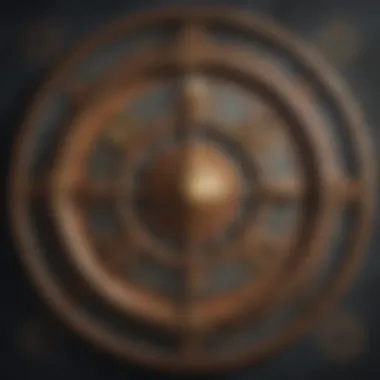Decoding Your Astrological Sign Chart Insights


Intro
By examining your sign chart, you’ll uncover the interplay between various celestial bodies and their positions at the time of your birth. This information is essential in comprehending not only your zodiac sign but also the nuances that shape your unique character. As we plunge into the depths of astrological sign charts, we will elucidate key components, unveil methodologies to create your chart, and offer insights about its practical applications in everyday life.
Zodiac Profiles
Astrological signs are more than mere symbols; each one embodies distinctive traits that contribute to the complex tapestry of human behavior. By immersing ourselves in the profiles of these signs, we can cultivate a better understanding of ourselves as well as those around us.
Overview of Each Sign
Astrology is divided into twelve signs, ranging from Aries, known for its fiery bravado, to Pisces, beloved for its empathy and imagination. Here’s a quick tour through the zodiac signs:
- Aries: The initiator, courageous and competitive.
- Taurus: The steadfast grounder, valuing comfort and stability.
- Gemini: The communicative thinker, adaptable and curious.
- Cancer: The nurturing caregiver, intuitive and emotional.
- Leo: The natural leader, confident and enthusiastic.
- Virgo: The detail-oriented analyst, practical and meticulous.
- Libra: The harmonious peacemaker, charming and diplomatic.
- Scorpio: The intense transformer, passionate and secretive.
- Sagittarius: The adventurous seeker, intellectually curious and optimistic.
- Capricorn: The disciplined achiever, ambitious and diligent.
- Aquarius: The forward-thinker, innovative and humanitarian.
- Pisces: The empathetic dreamer, imaginative and sensitive.
Personality Traits
Understanding the characteristic traits of each sign can illuminate how they express themselves within relationships, career, or personal endeavors. For example, Leos often possess a flair for the dramatic, and they shine brightest in social settings. Conversely, Cancers may retreat into their shells when feeling vulnerable, showcasing their protective nature.
Strengths and Weaknesses
When contemplating the strengths and weaknesses inherent in each sign, it’s essential to identify not just what makes us thrive but also what can pose challenges:
- Aries: Strength—boldness; Weakness—impulsiveness.
- Taurus: Strength—determination; Weakness—stubbornness.
- Gemini: Strength—versatility; Weakness—indecisiveness.
- Cancer: Strength—empathy; Weakness—over-sensitivity.
- Leo: Strength—creativity; Weakness—arrogance.
- Virgo: Strength—analytical skills; Weakness—over-critical.
- Libra: Strength—diplomatic; Weakness—avoidance of conflict.
- Scorpio: Strength—resourcefulness; Weakness—jealousy.
- Sagittarius: Strength—idealism; Weakness—restlessness.
- Capricorn: Strength—discipline; Weakness—pessimism.
- Aquarius: Strength—originality; Weakness—detachment.
- Pisces: Strength—imagination; Weakness—escapism.
"Astrology indicates the probable but does not compel—understand its nuances and harness them in your daily life."
As we journey further, we will examine the compatibility insights that can help define the layers of relationships influenced by these astrological signatures.
Intro to Sign Charts
Understanding sign charts can seem like venturing into uncharted waters for many. However, this journey into the stars carries immense value, offering insights that can reshape one’s perspective on both life and self-awareness. In this section, we will explore the fundamental aspects of sign charts, delving into what they are and why they truly matter.
What is a Sign Chart?
A sign chart, also known as a natal chart, is a snapshot of the sky at a specific moment in time—usually the moment of a person’s birth. Think of it as a celestial map, where each planet and zodiac sign reflects different facets of one's personality and experiences. Each component within this chart provides a glimpse into various characteristics, potential challenges, and inherent strengths.
In this grid of astrological symbolisms, the sun represents your core self, the moon reflects your emotional side, and the rising sign—often considered the mask one wears in social situations—offers insight into how you present yourself to the world. Once you grasp these pieces, the intricate tapestry of your astrological makeup begins to form, revealing layers of complexity that go far beyond mere sun signs.
Historical Context of Astrological Charts
Astrology dates back thousands of years, with roots embedded in ancient civilizations. From the Babylonians to the Greeks, charts have been used to track celestial movements, guiding decisions ranging from the mundane to the monumental. The ancient Greeks considered astrology a science, believing that celestial bodies influenced human affairs.
In cultures across the ages, sign charts offered a way to understand the cosmos and its connection to human life. Each epoch contributed to the evolved structure of these charts, integrating mathematical precision with mystical interpretations. Today, while the scientific community remains skeptical, countless individuals still turn to sign charts as a means of self-discovery and personal insights—sometimes viewing them as a guiding star in turbulent times.
The Importance of Understanding Your Sign Chart
Grasping the nuances of your sign chart can enhance not just your self-awareness but your relationships with others too. Recognizing these astrological influences allows for a more profound understanding of your desires, fears, and motivations. It’s about connecting the dots between personal experiences and the cosmic environment that shapes them.
Understanding how planets interact within your chart facilitates a customized approach to personal development. For example, if Mars is prominent, it may suggest a passionate drive—yet, without knowledge of this influence, you might misinterpret this energy as aggression or impatience.
Moreover, using your sign chart for decision-making—be it in career moves, relationship choices, or major life transitions—can illuminate possible paths you might not have otherwise considered. In essence, understanding your sign chart isn’t just about following the stars, but rather equipping yourself with knowledge that can lead to empowerment and clarity in your life.
"Your sign chart is like a user manual for your soul; it tells you not just how to drive your vehicle but how to tune it for optimal performance."


As we continue this exploration into the depths and dynamics of sign charts, remember that each person’s chart is unique, weaving a story that is singular as the individual it represents.
Components of a Sign Chart
When we talk about astrological sign charts, the components play an essential role in painting an accurate picture of one's celestial identity. These components—zodiac signs, planets, houses, and aspects—form the building blocks of the chart, each offering unique insights into one’s character, destiny, and interactions with the world. By understanding these components, astrology enthusiasts can uncover the nuances of their personalities and life experiences. This understanding can sharpen decision-making, enhance self-awareness, and navigate relationships more effectively.
Zodiac Signs Overview
Zodiac signs are perhaps the most recognizable elements of astrology. Each sign represents a specific constellation and embodies particular traits and energies. There are twelve zodiac signs, each covering a segment of the celestial wheel:
- Aries: Born leaders, assertive yet impulsive.
- Taurus: Grounded and reliable, with a love for beauty.
- Gemini: Curious and communicative, often seen as the social butterflies of the zodiac.
- Cancer: Nurturing and empathetic, they often put family first.
- Leo: Charismatic and confident, natural performers.
- Virgo: Detail-oriented and analytical, often health-conscious.
- Libra: Peace-loving and diplomatic, balancing harmony and justice.
- Scorpio: Intense and mysterious, known for their depth of feeling.
- Sagittarius: Adventurous and philosophical, constantly seeking knowledge.
- Capricorn: Disciplined and ambitious, often striving for success.
- Aquarius: Innovative and independent, often ahead of their time.
- Pisces: Dreamy and artistic, possessing a rich inner world.
Understanding your sun sign—based on your birth date—is crucial, but knowing how other signs influence your chart adds layers to your personality assessment.
Planets and Their Influence
In astrology, each planet symbolizes specific energies and influences that affect human behavior and emotions. The sun and moon are pivotal, representing core aspects of one’s identity and feelings, respectively. Other notable planets include:
- Mercury: Communication and intellect; governs how we think and share ideas.
- Venus: Love, beauty, and harmony; relates to relationships and attractions.
- Mars: Energy, assertiveness, and conflict; tied to our drive and ambition.
- Jupiter: Growth and expansion; influences luck and philosophy.
- Saturn: Discipline and structure; teaches lessons through challenges.
- Uranus: Innovation and rebellion; inspires change and unique perspectives.
- Neptune: Dreams and spirituality; linked to intuition and the unconscious.
- Pluto: Transformation and power; relates to deep change and regeneration.
By examining the positions of these planets in your sign chart, you'll glean insights into various aspects of your life, including love, career, and personal growth. This cosmic dance between the planets offers a wide array of interpretations for both personal reflection and practical applications.
Houses in Astrology
Houses in a sign chart represent different life areas where planetary influences manifest. Each house corresponds to specific themes, much like chapters in a book of your life. There are twelve houses:
- First House: Self-image and physical appearance.
- Second House: Finances and personal values.
- Third House: Communication and local community.
- Fourth House: Home and family life.
- Fifth House: Creativity, romance, and leisure.
- Sixth House: Health, service, and daily routines.
- Seventh House: Partnerships and marriage.
- Eighth House: Transformation, shared resources, and intimacy.
- Ninth House: Beliefs and higher learning.
- Tenth House: Career and public life.
- Eleventh House: Friendships and aspirations.
- Twelfth House: Subconscious and spiritual growth.
By understanding which planets occupy these houses, you will see where your astrological influences are most potent in your day-to-day life.
Aspects: The Relationships Between Celestial Bodies
Aspects describe the angles between planets in your chart. They illustrate how planets interact and can either harmonize or challenge each other. There are several key aspects to consider:
- Conjunction: A tight alliance; energies blend positively.
- Sextile: A favorable connection; opportunities arise naturally.
- Square: A challenging aspect; often breeds conflict but also growth.
- Trine: A harmonious aspect; beneficial energies flow smoothly.
- Opposition: A balancing act; polarizing forces that can lead to resolution.
Understanding these aspects helps you see the textures of your experiences, revealing how different parts of your personality work together or come into conflict. Just like a band, some planets harmonize beautifully, while others might need more practice before they find common ground.
In summary, each component of a sign chart offers essential details that contribute to a comprehensive understanding of oneself and one’s experiences. The interplay of zodiac signs, planets, houses, and aspects forms a unique celestial map. This map is not just a guide to one’s personality but a roadmap for navigating life's journey.
How to Obtain Your Sign Chart
Grasping your astrological sign chart can feel like holding a key to cosmic secrets. To fully benefit from astrology, knowing how to obtain your sign chart is crucial. This process lays the foundation, allowing you to decode your personal celestial blueprint accurately. Understanding how to get this chart not only enhances your journey into astrology but also empowers you to make informed decisions based on your unique astrological alignments.
Essential Information Required
Before diving into the vast universe of astrology, you need to gather specific bits of information. It’s like preparing for a road trip; having the right map is essential. Here’s what you'll need:
- Date of Birth: This is your anchor point; the universe has aligned for you on that particular day. It determines the positions of celestial bodies on your birthday.
- Time of Birth: Even a few minutes can swing the pendulum significantly. The precise time tells where the planets were when you arrived.
- Location of Birth: The geographic coordinates comparatively change your chart’s nuances because the position of celestial bodies varies depending on your place on Earth.
Having these three pieces of information is vital for generating an accurate sign chart. The more precise they are, the clearer your astrological map will be.
Online Tools and Resources for Chart Generation


In today's digital age, you don’t have to dive into dusty books or seek personal guidance immediately. Multiple online platforms can generate your sign chart for you. Here are a few that get the credibility nod:
- Astro.com: A well-known site offering comprehensive chart services. You simply plug in your essential info, and voilà, your personalized chart is generated.
- Cafe Astrology: This site not only provides chart generation but also offers insights into what those cosmic arrangements mean for you.
- AstroSeek: This tool has an array of charts and calculators suited for different astrological needs.
Most of these tools are user-friendly; just input your data and start exploring. However, remember that your chart is a complex map, and while these tools simplify the process, they might not dig deep into nuances that's better handled with a professional touch.
Consulting with Astrologers
If you find online resources a bit overwhelming or you're craving a more personalized interpretation, consulting an astrologer might be the way to go. They possess the expertise that can unveil layers of meanings in your sign chart. Here’s what to consider:
- Local vs. Online: You can go for a face-to-face consultation with local astrologers or opt for online sessions with globally recognized experts. Websites like Kepler College or even social media platforms can connect you with professionals.
- Check Credentials: Ensure that the astrologers you consider have solid backgrounds and experience in the field. Ask for references or check their reviews online to avoid the proverbial needle in the haystack.
- Ask Questions: Don't shy away from expressing your chart’s elements that puzzle you. A good astrologer welcomes questions and helps demystify any confusing aspects.
In wrapping up this section, obtaining your sign chart may require a bit of groundwork, but every bit of effort pays off. It acts as a roadmap, helping you see beyond mere zodiac predictions, allowing you to navigate life with a cosmic compass.
Interpreting Your Sign Chart
Interpreting your sign chart is the heart of astrological analysis. It's more than looking at symbols; it’s about understanding the intricate dance between celestial bodies and how they narrate your life’s story. Each section of the chart offers a piece of the puzzle that reflects your personality, potential, and even challenges you might face. By delving into this area, you can unlock the nuances of your chart that speak to who you are at your core.
Reading the Chart: A Step-by-Step Guide
Navigating the nuances of a sign chart may seem daunting at first glance, but breaking it down into smaller pieces can help. Here’s a pragmatic approach to get you started:
- Gather Your Information: Ensure you have your birth date, time, and location. This data is essential for accuracy.
- Obtain Your Chart: Use an online tool or software to generate your chart. You may find useful resources on sites like en.wikipedia.org or reddit.com.
- Identify the Components: Familiarize yourself with the key elements of your chart. Look for your Sun, Moon, and Rising signs, as well as the houses.
- Analyze the Aspects: Note how the planets interact with one another in your chart. Different angles carry various meanings.
- Reflect: Take a moment to give thought to what each element might represent in your life.
This step-by-step approach allows you to gain clarity on the often complex world of astrology.
Understanding Your Sun, Moon, and Rising Signs
Three components hold a pivotal place in your astrological identity: the Sun sign, Moon sign, and Rising sign. Each serves a distinct role in shaping your character and how you present yourself.
- Sun Sign: This is your core identity, shedding light on your basic personality traits. It’s often considered the ‘essence’ of who you are.
- Moon Sign: Your emotional self is reflected here. It reveals how you feel and respond to situations. It digs deeper than the exterior, tapping into your instincts and intuition.
- Rising Sign: Also known as the Ascendant, this sign dictates your outward persona. It’s the first impression you make on the world, how others perceive you before they understand your deeper qualities.
Understanding these three signs forms the foundational framework for introspection and personal growth.
Analyzing Planetary Positions
Each planet in your chart holds its own significance. Understanding their placements can provide insight into various facets of your life:
- Personal Planets: Mercury, Venus, and Mars influence your communication style, relationships, and drive, respectively.
- Social Planets: Jupiter and Saturn can tell tales about your growth, aspirations, boundaries, and challenges.
- Transpersonal Planets: Uranus, Neptune, and Pluto often address broader themes of transformation and collective evolution.
By analyzing where these planets reside within your chart, one can glean a deeper understanding of individual inclinations, strengths, and potential hurdles, painting a more rounded picture of life’s circumstances.
Always remember: Your chart is not a static blueprint. It reflects cycles and can evolve over time as you grow and experience life.
Leveraging an insightful interpretation of your sign chart can truly empower you. Understanding your astrological influences can lead to significant life shifts, making you more equipped to navigate relationships, career paths, and personal challenges with a newfound perspective.
Practical Applications of Your Sign Chart
Using Your Chart for Personal Growth
Your sign chart acts as a roadmap to self-discovery. Each element in your chart highlights strengths, weaknesses, and unique tendencies that shape who you are. For instance, if your Moon sign is in Taurus, you may find comfort in stability and routine. By recognizing this, you can embrace these traits rather than resist them, paving the way for personal growth. Consider the following benefits of integrating your sign chart into your self-improvement journey:
- Self-Awareness: Understanding your characteristics helps in making informed decisions about career, hobbies, and personal relationships.
- Emotion Regulation: Acknowledging the emotional patterns in your chart, such as having a sensitive Mercury in Pisces, can equip you to manage feelings more effectively.
- Goal Setting: Tailor your aspirations in alignment with your planetary placements, ensuring they're realistic yet aspirational.


"Awareness of oneself is the first step to becoming who you want to be."
Navigating Relationships through Astrology
Astrology provides a unique lens through which you can view relationships. Understanding both your own chart and that of others helps you find compatible connections and tackle potential friction. Certain aspects can shine light on how you relate to friends, family, and partners. For instance, if you have a Venus in Gemini, you might thrive in conversations and seek stimulating company. Here are useful takeaways:
- Compatibility Assessments: Knowing the elements between your chart and another’s can help gauge relationship dynamics.
- Conflict Resolution: Understanding astrological reasoning behind disagreements can lead to more empathetic perspectives. If a partner has a fiery Mars, learn how to manage that passion instead of stifling it.
- Communication Strategies: Moon placements can help draft better strategies for heartfelt conversations.
Making Decisions with Astrological Insights
Guidance from your sign chart can extend to everyday decisions and life-changing choices. Whether considering career moves or evaluating personal relationships, harnessing astrological insights may steer you in a beneficial direction. Each planet's position can guide you on timing, opportunities, and areas of focus. Here are some practical considerations:
- Timing Decisions: Certain planetary transits are better suited for specific actions. For instance, starting new projects during a New Moon may align with fresh beginnings.
- Career Choices: If your Midheaven sign aligns with the characteristics of administration, a managerial position may resonate with your core identity.
- Personal Endeavors: Use insights from your sign chart to choose hobbies that align with your passions and natural inclinations.
In summary, understanding the practical applications of your sign chart can weave astrology seamlessly into your daily life. By incorporating this knowledge, you elevate self-awareness, navigate relationships more effectively, and make astute decisions that align with cosmic rhythms.
Common Misconceptions about Sign Charts
Understanding the common misconceptions surrounding astrological sign charts is vital in clarifying the confusion that often arises in discussions about astrology. Many people hold beliefs that can distort their perception of what astrology truly embodies. The goal here is to highlight why this topic matters and how it can enhance one's understanding of astrological concepts.
Misconceptions not only mislead individuals about the nature of astrology but can also affect their engagement with it as a meaningful tool for personal growth. By debunking these myths, readers can approach astrology from a more informed and open-minded perspective, allowing them to fully integrate its principles into their lives.
Astrology vs. Astronomy
One of the most pervasive misconceptions is viewing astrology and astronomy as the same entity. While both fields deal with celestial phenomena, they stem from completely different perspectives and aims. Astronomy is the scientific study of celestial bodies like stars, planets, and galaxies. It employs mathematics and physics to understand their movements and compositions.
In contrast, astrology focuses on the celestial positions and their perceived influences on human behavior and events on Earth. Some argue that astrology has no scientific basis, and indeed it is not a science in the way astronomy is defined.
But considering astrology merely as a pseudoscience undermines its cultural and historical significance. Many people find comfort, guidance, and insight through astrological interpretations, which can help them navigate life's challenges. Understanding this division helps clarify that astrology isn't designed to rival scientific inquiry; it complements personal insights with celestial reflections.
"Astrology is not about predicting the future; it's about understanding oneself through the lens of cosmic patterns."
Fixed Beliefs vs. Flexibility in Interpretation
Another layer of misunderstanding involves the rigidity associated with sign charts. Many people assume that their astrological sign strictly determines their personality traits and future outcomes. This narrow interpretation can lead to frustrations when life does not align with astrological predictions.
Astrology thrives on flexibility. A single astrological sign interacts with various planetary positions, aspects, and houses, weaving a complex narrative that requires an open mind to interpret. Each sign can manifest in myriad ways based on individual experiences, backgrounds, and choices.
Engaging with astrology should be more about exploring possibilities rather than sticking rigidly to a set belief system. Recognizing this fluidity allows individuals to use astrology as a tool for self-discovery rather than a deterministic prophecy. By embracing this flexibility, one can better apply astrological insights to various aspects of life, leading to a more enriched and multi-faceted understanding of personal journeys.
In summary, addressing these misconceptions prepares readers for a more gratifying exploration of astrology. Acknowledging the differences between astrology and astronomy helps to establish a foundational understanding, while appreciating the flexibility in astrological interpretation opens doors to deeper insights that can greatly enhance one's life experience.
Culmination
Recap of Key Points
To synthesize the main themes addressed in this article:
- Components of the Sign Chart: Your sign chart is made up of zodiac signs, planets, houses, and aspects, each playing a specific role in the way you express yourself and interact with the world.
- Obtaining Your Chart: You learned how to collect the necessary information to generate your sign chart using both online tools and professional astrologers.
- Interpreting the Chart: The article offered a step-by-step approach to reading your chart, emphasizing the significance of understanding your sun, moon, and rising signs, as well as planetary positions.
- Practical Applications: By applying the insights from your sign chart, it's possible to aid personal development, improve relationships, and make more informed decisions in your life's journey.
By recognizing these pivotal aspects, readers can better appreciate the depth of their personal astrological maps.
Encouraging Continued Exploration of Astrology
Astrology is a vast and intricate field that invites continual study and reflection. The beauty of astrological insights lies in their ability to adapt and grow with you. As you face new challenges and experiences, your understanding of your sign chart can deepen, revealing deeper meanings and pathways. There are always more layers to uncover.
- Connect with Astrological Communities: Engaging with fellow enthusiasts through platforms like Reddit can provide fresh perspectives and interpretations. Check out subreddits focusing on astrology for lively discussions and knowledge sharing.
- Stay Informed: Keeping abreast of new teachings and methodologies in astrology can enrich your understanding. Resources from academic sites like Britannica or even social media pages dedicated to astrology can provide additional layers of insight.
- Reflect and Integrate: Use journaling to reflect on how astrological insights manifest in your daily life. Connecting what you learn back to your experiences can enhance your understanding and make the practice more personal.
Embracing astrology as a lifelong journey opens up pathways not just for self-growth but also for a deeper connection with the universe around you. Let your astrological sign chart be a compass as you forge your unique path through life.



